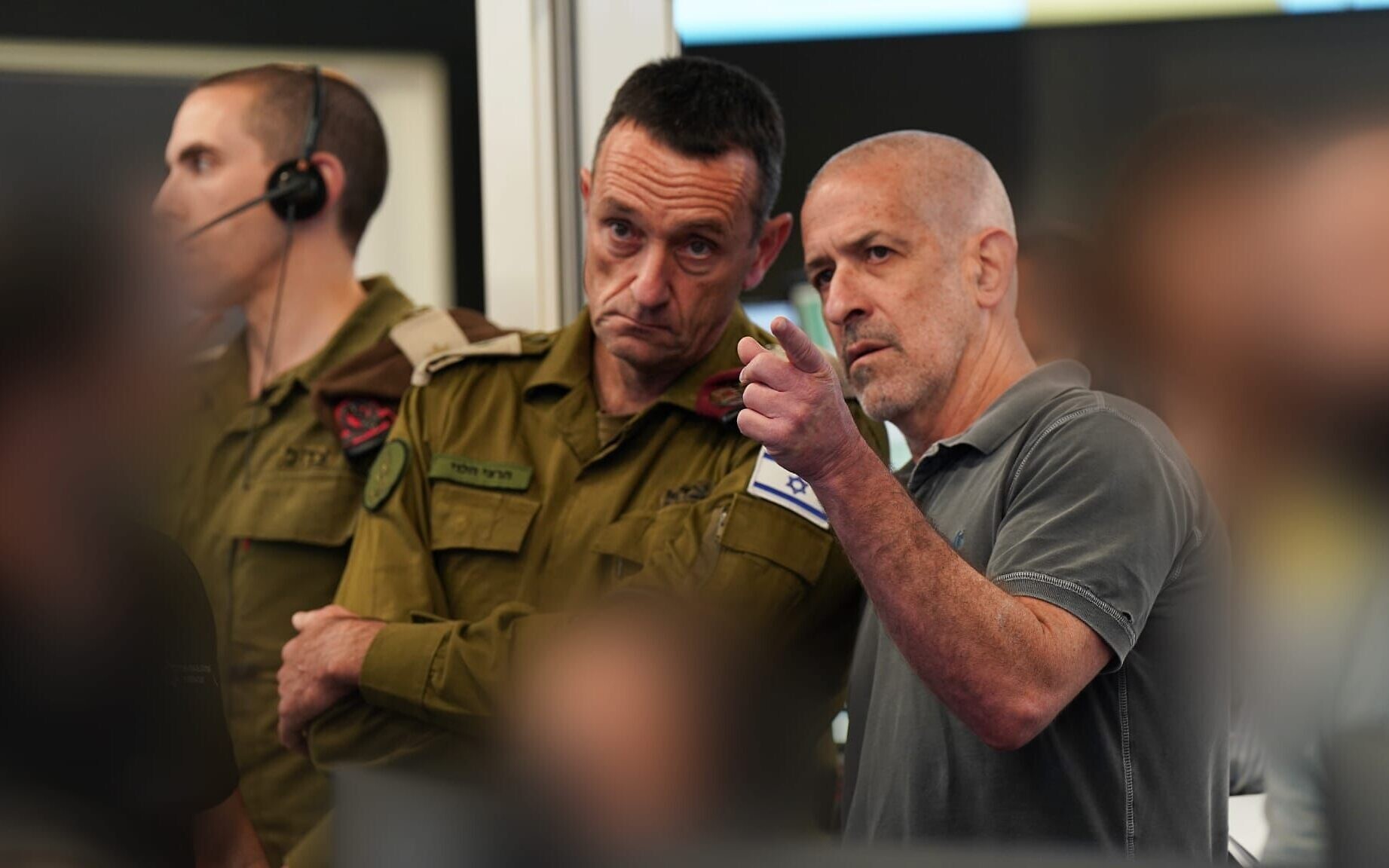



Benny Gantz and Gadi Eisenkot resigned from the emergency war cabinet on June 9. During their time on the panel, especially during the later months, the two were subjected to repeated attacks by far-right ministers of the Religious Zionism and Otzma Yehudit parties. Likud members also saw their presence in the war cabinet — Gantz as a full member; Eisenkot as an observer — as a convenient political target.
The two National Unity party leaders were seen as something of a left-wing element within the government, a pair of ministers who put freeing the remaining hostages taken by Hamas on October 7 at the top of their priorities, and as such as legitimate targets. They were eventually joined by Defense Minister Yoav Gallant, who often agreed with Gantz and Eisenkot’s strategic positions. So he, too, has become a sitting target, even for ministers and MKs from his own Likud party.
Gantz and Eisenkot left the government, but Gallant stayed. And now the chiefs of the Israel Defense Forces and the Shin Bet are under fire, alongside the defense minister. No matter what they do or say, there will always be an attack from somewhere on the right.
The general strategy is exemplified by firebrand Likud MK Tally Gotliv, who is known to be close to National Security Minister Itamar Ben Gvir. This week she repeated her contentious claim that Shin Bet chief Ronen Bar is involved in planning a military coup against Prime Minister Benjamin Netanyahu, together with IDF Chief of Staff Lt. Gen. Herzi Halevi, after Gaza’s Shifa Hospital director Mohammad Abu Salmiya, who is suspected of collaboration with Hamas, was released from Israeli custody.
Far-right ministers Bezalel Smotrich and especially Ben Gvir took their gloves off and took on the Shin Bet. Ben Gvir even claimed that Bar was threatening to release more Palestinian security prisoners.
The Shin Bet responded that it had been warning for a year that there were not enough prison cells to hold suspects, and said that Ben Gvir had ignored its concerns, knowing full well that the result would be many Palestinian detainees walking free to make room for other inmates.
This bickering between Ben Gvir and the Shin Bet continued on Tuesday, with no holds barred. I’ve never seen such a public political spat between ministers and the secret services, even in the most serious of crises.
Even after prime minister Yitzhak Rabin’s assassination, ministers didn’t come out against the Shin Bet so blatantly over the security failures. Even in the years when Gilad Shalit was held hostage by Hamas — when there was harsh criticism in the cabinet of the Shin Bet, which for a long time refused to sign off on releasing Palestinian security prisoners in exchange for Shalit — qualms were generally aired in private, behind closed doors.
On Tuesday, the far-right ministers found a new cause to attack the defense minister and the military chiefs. This time, about connecting a desalination plant in the Gaza Strip to the Israeli power grid.
About a month ago, The Times of Israel’s Hebrew sister site, Zman Yisrael, revealed that there has been direct Israeli-Palestinian cooperation throughout the war to resume the water supply from Israel to the Strip — including the restoration of pumping facilities in the Strip that were rendered inoperative during the fighting, under heavy IDF security.
On Tuesday, the IDF explained that the work also has sanitation implications — it protects Israeli troops operating in Gaza, as well as Palestinians, from the spread of disease. It seems that the discussion at the world courts in The Hague played a role here, and of course it’s common sense that an epidemic in the Strip would overflow into Israel.
But Smotrich and Ben Gvir were not convinced. “We’ve completely lost our minds,” Smotrich wrote. “We’re rehabilitating Gaza before it has been demilitarized. Mr. Prime Minister, stop this madness. this time it will be impossible to say we didn’t know.”
By now, this has become a standard knee-jerk reaction against the military. As right-wing agitators before they entered the government, Smotrich and Ben Gvir spent decades clashing with the IDF, the police and the Shin Bet, so it’s only natural that they’re keeping up the dissent.
On Tuesday I tried to challenge them both, from a different perspective. I told them that connecting Gaza’s power to the Israeli grid was actually aligned with their goals — after all, they aspire to full Israeli sovereignty in Gaza and want to establish Jewish communities in the Strip after the war with Hamas. Hooking Gaza up to the Israeli grid would be essential to provide electricity to these “old-new” settlements.
Smotrich didn’t buy it. “The defense minister is making decisions by himself, without consulting with the cabinet,” he told me. “If it was part of a plan to establish a military regime in Gaza, I’d be in favor. This is half-assed. Hamas will take control of the electricity just like it steals humanitarian aid. This is a grave mistake that we can’t afford to make.”
Ben Gvir also shot down my challenge. Apparently the offensive against Gallant, the Shin Bet and the IDF chief of staff is more important to him.
Keep in mind that the insurrection of Smotrich and Ben Gvir, currently on the rise, is a direct continuation of attacks by Likud ministers on the heads of the IDF, Shin Bet and military intelligence — especially coming from David Amsalem and Miri Regev in the security cabinet. Netanyahu didn’t stop them — perhaps even the opposite — and now he’s not stopping Smotrich and Ben Gvir, who are spoiling for their next fight.
As ever, the only voice of reason in this cacophony is Interior Minister Moshe Arbel of Shas, who on Tuesday appealed to the prime minister to “prevent ministers from slandering the head of the Shin Bet.”
Netanyahu did not stop anything, of course. And today there will probably be a new attack on the target — the what and the why being irrelevant.
Translated and edited from the original on the Times of Israel’s Hebrew site, Zman Yisrael.




